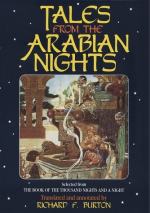[FN#223] A slang name for Death. “Kash’am” has various sigs. esp. the lion, hence Rabi’at al-Faras (of the horses), one of the four sons of Nizar was surnamed Al-Kash’am from his coeur de lion (Al-Mas’udi iii. 238). Another pleasant term for departing life is Abu Yahya = Father of John, which also means “The Living” from Hayy—Death being the lord of all: hence “Yamut” lit.= he dies, is an ill-omened name amongst Arabs. Kash’am is also a hyena, and Umm Kash’am is syn. with Umm ’Amir (vol. i. 43). It was considered a point of good breeding to use these “Kunyah” for the purpose of varying speech (see al-Hariri Ass. xix.). The phrase in the text = meaning went to hell, as a proverb was first used by Zuhayr, one of the “Suspended Poets.” Umm Kash’am was the P.N. of a runaway camel which, passing by a large fire, shied and flung its riding saddle into the flames. So in Al-Siyuti’s “History of the Caliphs” (p. 447), the text has “And Malak Shah went to where her saddle was thrown by Umm Kash’am,” which Major Jarrett renders “departed to hell-fire.”
[FN#224] Scott’s “Story of the Bhang-eater and Cauzee,” vi. 126: Gauttier, Histoire du Preneur d’Opium et du Cadi, vi. 268.
[FN#225] Arab. “Lawwaha” = lit. pointing out, making clear.
[FN#226] Text “in his belly,” but afterwards in his “Halkah” = throat, throttle, which gives better sense.
[FN#227] In text “Hayishah” from “Haysh” = spoiling, etc.
[FN#228] Arab. “Yauh!” See vols. ii. 321; vi. 235.
[FN#229] Arab. “Ya Jad’an” (pron. “Gad’an”) more gen. “Ya Jad’a” = mon brave!
[FN#230] In text “Ya ’Arzad”: prob. a clerical slip for “’Urzat,” plur. of “’Urzah” = a companion, a (low) fellow, a man evil spoken of.
[FN#231] Easterns love drinking in a bright light: see vol. ii. 59.
[FN#232] Arab. “’Akl” (= comprehension, understanding) and “Nakl” (= copying, describing, transcribing), a favourite phrase in this Ms.
[FN#233] Arab. “Ummali”; gen. Ummal, an affirmation; Certes, I believe you!
[FN#234] For the many preparations of this drug, see Herklots, Appendix, pp. lxviii. ciii. It is impossible to say how “Indian hemp,” like opium, datura, ether and chloroform, will affect the nervous system of an untried man. I have read a dozen descriptions of the results, from the highly imaginative Monte Cristo to the prose of prosaic travellers; and do not recognise that they are speaking of the same thing.
[FN#235] This tranquil enjoyment is popularly called “Kayf.” See my Pilgraimage i. 13. In a coarser sense it is applied to all manners of intoxication; and the French traveller Sonnini says, “The Arabs (by which he means the Egyptians) give the name of Kayf to the voluptuous relaxation, the delicious stupor, produced by the smoking of hemp.” I have smoked it and eaten it for months without other effect than a greatly increased appetite and a little drowsiness.




